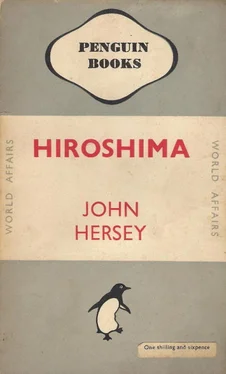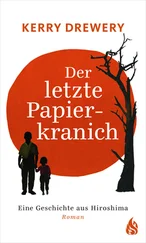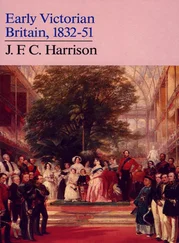John Hersey - Hiroshima
Здесь есть возможность читать онлайн «John Hersey - Hiroshima» весь текст электронной книги совершенно бесплатно (целиком полную версию без сокращений). В некоторых случаях можно слушать аудио, скачать через торрент в формате fb2 и присутствует краткое содержание. Город: London, Год выпуска: 1946, Издательство: Penguin Books, Жанр: История, на английском языке. Описание произведения, (предисловие) а так же отзывы посетителей доступны на портале библиотеки ЛибКат.
- Название:Hiroshima
- Автор:
- Издательство:Penguin Books
- Жанр:
- Год:1946
- Город:London
- ISBN:нет данных
- Рейтинг книги:4 / 5. Голосов: 1
-
Избранное:Добавить в избранное
- Отзывы:
-
Ваша оценка:
- 80
- 1
- 2
- 3
- 4
- 5
Hiroshima: краткое содержание, описание и аннотация
Предлагаем к чтению аннотацию, описание, краткое содержание или предисловие (зависит от того, что написал сам автор книги «Hiroshima»). Если вы не нашли необходимую информацию о книге — напишите в комментариях, мы постараемся отыскать её.
Hiroshima — читать онлайн бесплатно полную книгу (весь текст) целиком
Ниже представлен текст книги, разбитый по страницам. Система сохранения места последней прочитанной страницы, позволяет с удобством читать онлайн бесплатно книгу «Hiroshima», без необходимости каждый раз заново искать на чём Вы остановились. Поставьте закладку, и сможете в любой момент перейти на страницу, на которой закончили чтение.
Интервал:
Закладка:
“He didn’t want to come with us,” Father Kleinsorge said. “He ran back.”
When Miss Sasaki heard the voices of the people caught along with her in the dilapidation at the tin factory, she began speaking to them. Her nearest neighbour, she discovered, was a high-school girl who had been drafted for factory work, and who said her back was broken. Miss Sasaki replied, “I am lying here and I can’t move. My left leg is cut off.”
Some time later, she again heard somebody walk overhead and then move off to one side, and whoever it was began burrowing. The digger released several people, and when he had uncovered the high-school girl, she found that her back was not broken, after all, and she crawled out. Miss Sasaki spoke to the rescuer, and he worked toward her. He pulled away a great number of books, until he had made a tunnel to her. She could see his perspiring face as he said, “Come out, Miss.” She tried. “I can’t move,” she said. The man excavated some more and told her to try with all her strength to get out. But books were heavy on her hips, and the man finally saw that a bookcase was leaning on the books and that a heavy beam pressed down on the bookcase. “Wait,” he said “I’ll get a crowbar.”
The man was gone a long time, and when he came back, he was ill- tempered, as if her plight were all her fault, “We have no men to help you!” he shouted in through the tunnel. “You’ll have to get out by yourself.”
“That’s impossible,” she said. “My left leg. . .” The man went away.
Much later, several men came and dragged Miss Sasaki out. Her left leg was not severed, but it was badly broken and cut and it hung askew below the knee. They took her out into a courtyard. It was raining. She sat on the ground in the rain. When the downpour increased, someone directed all the wounded people to take cover in the factory’s air-raid shelters. “Come along,” a torn-up woman said to her. “You can hop.” But Miss Sasaki could not move, and she just waited in the rain. Then a man propped up a large sheet of corrugated iron as a kind of lean-to, and took her in his arms and carried her to it. She was grateful until he brought two horribly wounded people—a woman with a whole breast sheared off and a man whose face was all raw from a burn—to share the simple shed with her. No one came back. The rain cleared and the cloudy afternoon was hot; before nightfall the three grotesques under the slanting piece of twisted iron began to smell quite bad.
The former head of the Nobori-cho Neighbourhood Association to which the Catholic priests belonged was an energetic man named Yoshida. He had boasted, when he was in charge of the district air-raid defences, that fire might eat away all of Hiroshima but it would never come to Nobori-cho. The bomb blew down his house, and a joist pinned him by the legs, in full view of the Jesuit mission house across the way and of the people hurrying along the street. In their confusion as they hurried past, Mrs. Nakamura, with her children, and Father Kleinsorge, with Mr. Fukai on his back, hardly saw him; he was just part of the general blur of misery through which they moved. His cries for help brought no response from them; there were so many people shouting for help that they could not hear him separately. They and all the others went along. Nobori-cho became absolutely deserted, and the fire swept through it. Mr. Yoshida saw the wooden mission house—the only erect building in the area—go up in a lick of flame, and the heat was terrific on his face. Then flames came along his side of the street and entered his house. In a paroxysm of terrified strength, he freed himself and ran down the alleys of Nobori-cho, hemmed in by the fire he had said would never come. He began at once to behave like an old man; two months later his hair was white.
As Dr. Fujii stood in the river up to his neck to avoid the heat of the fire, the wind blew stronger and stronger, and soon, even though the expanse of water was small, the waves grew so high that the people under the bridge could no longer keep their footing. Dr. Fujii went close to the shore, crouched down, and embraced a large stone with his usable arm. Later it became possible to wade along the very edge of the river, and Dr. Fujii and his two surviving nurses moved about two hundred yards upstream, to a sandspit near Asano Park. Many wounded were lying on the sand. Dr. Machii was there with his family; his daughter, who had been outdoors when the bomb burst, was badly burned on her hands and legs but fortunately not on her face. Although Dr. Fujii’s shoulder was by now terribly painful, he examined the girl’s burns curiously. Then he lay down. In spite of the misery all around, he was ashamed of his appearance, and he remarked to Dr. Machii that he looked like a beggar, dressed as he was in nothing but torn and bloody underwear. Later in the afternoon, when the fire began to subside, he decided to go to his parental house, in the suburb of Nagatsuka. He asked Dr. Machii to join him, but the Doctor answered that he and his family were going to spend the night on the spit, because of his daughter’s injuries. Dr. Fujii, together with his nurses, walked first to Ushida, where, in the partially damaged house of some relatives, he found first-aid materials he had stored there. The two nurses bandaged him and he them. They went on. Now not many people walked in the streets, but a great number sat and lay on the pavement, vomited, waited for death, and died. The number of corpses on the way to Nagatsuka was more and more puzzling. The Doctor wondered: Could a Molotov flower basket have done all this?
Dr. Fujii reached his family’s house in the evening. It was five miles from the centre of town, but its roof had fallen in and the windows were all broken.
All day, people poured into Asano Park. This private estate was far enough away from the explosion so that its bamboos, pines, laurel, and maples were still alive, and the green place invited refugees—partly because they believed that if the Americans came back, they would bomb only buildings; partly because the foliage seemed a centre of coolness and life, and the estate’s exquisitely precise rock gardens, with their quiet pools and arching bridges, were very Japanese, normal, secure; and also partly (according to some who were there) because of an irresistible, atavistic urge to hide under leaves. Mrs. Nakamura and her children were among the first to arrive, and they settled in the bamboo grove near the river. They all felt terribly thirsty, and they drank from the river. At once they were nauseated and began vomiting, and they retched the whole day. Others were also nauseated; they all thought (probably because of the strong odour of ionization, an “electric smell” given off by the bomb’s fission) that they were sick from a gas the Americans had dropped. When Father Kleinsorge and the other priests came into the park, nodding to their friends as they passed, the Nakamuras were all sick and prostrate. A woman named Iwasaki, who lived in the neighbourhood of the mission and who was sitting near the Nakamuras, got up and asked the priests if she should stay where she was or go with them. Father Kleinsorge said, “I hardly know where the safest place is.” She stayed there, and later in the day, though she had no visible wounds or burns, she died. The priests went farther along the river and settled down in some underbrush. Father LaSalle lay down and went right to sleep. The theological student, who was wearing slippers, had carried with him a bundle of clothes, in which he had packed two pairs of leather shoes. When he sat down with the others, he found that the bundle had broken open and a couple of shoes had fallen out and now he had only two lefts. He retraced his steps and found one right. When he rejoined the priests, he said, “It’s funny, but things don’t matter any more. Yesterday, my shoes were my most important possessions. To-day, I don’t care. One pair is enough.”
Читать дальшеИнтервал:
Закладка:
Похожие книги на «Hiroshima»
Представляем Вашему вниманию похожие книги на «Hiroshima» списком для выбора. Мы отобрали схожую по названию и смыслу литературу в надежде предоставить читателям больше вариантов отыскать новые, интересные, ещё непрочитанные произведения.
Обсуждение, отзывы о книге «Hiroshima» и просто собственные мнения читателей. Оставьте ваши комментарии, напишите, что Вы думаете о произведении, его смысле или главных героях. Укажите что конкретно понравилось, а что нет, и почему Вы так считаете.












